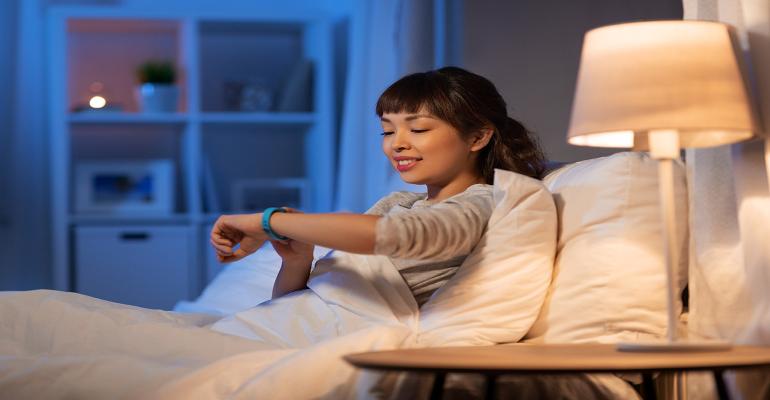A good night’s sleep is essential for the successful functioning of the immune system, physical health and helps fight depression and anxiety. Studies show that getting high-quality sleep can positively affect energy, activity, mood, and weight. However, COVID-19 created several challenges for those who previously didn’t have problems falling asleep. The uncertainty created by the pandemic has increased stress levels and had a definite impact on sleep and mental health.
According to a report published in the U.S. National Library of Medicine, around four in 10 people in the U.S. have reported trouble sleeping during the pandemic. Facing “Coronasomnia” myself, I started wearing Fitbit’s latest wearable, Luxe, to track my sleep and build good sleep hygiene practices. Unlike bulky wearables, Luxe is a dainty fitness tracker that proved to be a comfortable device to wear to bed.
While we are asleep each night, the body goes through several sleep cycles that last an average of 90 minutes. The sleep cycles include REM (Rapid Eye Movement) sleep, which is associated with vivid dreams, light sleep, and deep sleep, where there is less brain activity than REM sleep. Light sleep makes up most of the night’s sleep and promotes mental and physical restoration. REM is vital for memory and mood, while deep sleep helps with physical recovery and aspects of memory and learning and leaves one feeling refreshed.

The device gives a detailed sleep score, sleep duration, sleep stage breakdown, resting heart rate, and skin temperature variation at night. A Fitbit Premium membership provides even more detailed sleep and health insights. The sleep log includes detailed charts showing fluctuations between sleep stages, trends over time, and estimated oxygen variation overnight. The deviations are marked in a different colour to draw attention to potential irregularities in breathing.
The tracker can estimate sleep stages using a combination of movement and heart rate patterns. The wearable tracks beat-to-beat changes in the heart rate, known as heart rate variability (HRV), which fluctuates as one transitions between the different sleep stages. REM or deep sleep can’t be controlled, but adopting good sleep habits can help achieve the ideal stages.
Moreover, the tracker gives a sleep score out of 100 in the morning that considers the quality of the rest. These insights provide a better sense of the current state of health and fitness level.
Sleep coach
Along with the tracker, the Fitbit app acts as a much-needed health coach and provides detailed insights along with important tips. For instance, one of the first myths the app breaks is that getting eight hours of sleep isn’t for everyone. Instead, experts recommend at least 6.5 hours of sleep, but beyond those, individual needs vary.
The app also offers a ‘Get More Sleep’ guided programme, an easy-to-follow guide that helps get more sleep with guidance from sleep experts. First, you have to complete a survey that asks general questions such as “how much energy do you have when you wake up?” among others and sets a schedule accordingly.
The weekly guided sleep goal, based on sleep data, helps to improve sleep score. For example, my score for August varied between 72 to 80. I am hoping that I can bring it to 80 and above over time with good sleep habits.
The feature also helps set up a bedtime routine that involves relaxing 15 minutes before bed, which can help one fall and stay asleep. These activities can include reading, listening to music and taking a warm shower which can calm the mind and help unwind. In addition, certain relaxation tools are offered in the app library, such as meditation sessions, soothing music pieces like the piano and bansuri flute, and a guided session on gazing upon the night sky to experience more restful sleep.

Moreover, the guided body scan session focuses on deep breathing exercises that help to relax the body and drift off to sleep. For instance, breathing in and out of the nose is a technique that brings more oxygen and is proven to lower stress cortisol that will leave the mind peaceful and quiet.
In conclusion, the Fitbit Luxe packs a lot in a small package! Luxe tracks steps, sleep, and nudges to keep moving during the day as a standard fitness band. It is a sleek and stylish device, unlike the cumbersome fitness trackers in the market. It scores high on functionality with robust battery life and is perfect for those looking to get a general overview of their health. Personally, it has helped me become more mindful of my sleep patterns and is assisting me in following a consistent sleep schedule.
This article appears in the latest issue of Omnia Health Magazine. Read the full issue online today.


